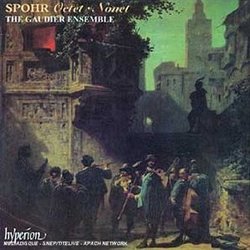| All Artists: Ludwig Spohr, Gaudier Ensemble Title: Spohr: Nonet / Octet Members Wishing: 0 Total Copies: 0 Label: Hyperion UK Release Date: 5/17/1994 Album Type: Import Genre: Classical Styles: Chamber Music, Historical Periods, Classical (c.1770-1830) Number of Discs: 1 SwapaCD Credits: 1 UPC: 034571166995 |
Search - Ludwig Spohr, Gaudier Ensemble :: Spohr: Nonet / Octet
CD Details |
CD ReviewsLovely music by a once famous composer/violinist Thomas K. Hill | Saigon, Vietnam | 06/20/2000 (4 out of 5 stars) "Louis (or Ludwig) Spohr's ouvre contains vast quantites of delightful music. A great deal of it written to showcase his violin virtuosity, as you will hear on this fine recording of his Nonet and Octet. This is a fine performance by an ensemble that is obviously having a good time. The recording is top notch also. There are delicious textures in the ensemble playing and virtouoso performances abound throughout the solos. If you like the Tchaikovsky and Dvorak String Serenades and/or the Dvorak Wind Serenade, you'll love this music by an unjustifiably obscure master." A Delight M. C. Passarella | Lawrenceville, GA | 01/05/2009 (5 out of 5 stars) "In his day, Spohr was one of the most highly regarded violinists and composers in the German-speaking world. Until eclipsed by Mendelssohn and Schumann, he was regarded as the greatest symphonist after Beethoven. And while his symphonies and even concertos are getting a new lease on life thanks to recordings, the two works on the present disc confirm for me that Spohr's finest and most memorable music is contained in his chamber works.
If you are looking for profundity on the order of late Beethoven or Schubert, you won't find it in Spohr. At least, if it exists in Spohr, I am still searching also. Spohr's muse is essentially lyrical, and gracious melody rather than deep drama is his forte. The dark little Adagio introduction of the Octet quickly evaporates into a sweet first melody that allows for gentle iterations by horn, clarinet, and violin one after another. In fact, one of the great strengths of both the Nonet and Octet is how fully Spohr exploits all of his instruments while at the same time creating highly compelling musical structures. This is quite a feat in the Nonet, a form that apparently only Boccherini had assayed before. Both works were commissioned by a rich Viennese textile manufacturer named Tost, whom scholars think is also connected with Haydn's Opus 64 String Quartets (though there is some confusion on this issue). Since Tost wanted to introduce the Octet in England, it features a slow movement the English could embrace immediately, based on Handel's "Harmonious Blacksmith." Spohr broadens and "romanticizes" Handel's jaunty little tune and creates a series of wholly characteristic variations that are about as far removed from Handel's working of the theme as Brahms's in his "Handel Variations." Perhaps the most interesting movement, though, is the restless Minuet, which is really a scherzo cast in the minor key and "rich" in the dissonances that Beethoven objected to in his friend and colleague's music. The Scherzo of the Nonet, with its two trios, is more conventional but no less attractive. The first trio, with its leading part for the violin, sounds like Schubert at his most lyrical. But it's the bubbly rondo finale that is the irresistible movement in this work. It's the kind of music you come away from whistling to yourself. The Gaudier Ensemble plays all of this music wonderfully, with tenderness in the slow movements, verve in the fast ones, and beauty of tone throughout. Hyperion's sound, as usual, is rich and truthful, having a real sense of presence. No great profundities, maybe, but this is entertainment of the highest order, ideally presented." |

